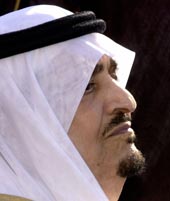 |
| King Fahd: Arab pioneer |
Riyadh, Aug. 1 (Reuters): Saudi Arabia’s King Fahd died today and Crown Prince Abdullah was swiftly pronounced monarch in a smooth succession set to maintain the policies of the world’s largest oil exporter and key US ally.
King Abdullah, who is at least 80, has run day-to-day affairs since a stroke debilitated Fahd in 1995. The kingdom’s next ambassador to Washington, who is a senior royal, said the new king would not alter oil and foreign policies.
Fahd, aged about 83, had been in hospital since May 27, when he was admitted with acute pneumonia.
In Washington, President George W. Bush spoke today to King Abdullah to offer US condolences on King Fahd’s death and to congratulate him on assuming the throne. US officials said Fahd’s death would have little effect on US relations with Saudi Arabia.
White House spokesman Scott McClellan cited Abdullah’s last visit to Bush's ranch in Crawford, Texas, in April. Bush warmly greeted Abdullah with a kiss on both cheeks and then firmly held his hand to guide him up the stone steps leading to his office.
Saudi Arabia’s commitment to continuity was further strengthened by King Abdullah’s decree to retain all cabinet ministers. “All members of the council of ministers will remain in their posts,” said the decree read out on state television.
Energy and financial analysts predicted that Fahd’s death will have no major impact on the Saudi economy, now booming on strong oil prices. The stock market, the largest Arab bourse, briefly suspended trading but rebounded after early declines.
Saudi information minister Iyad bin Amin Madani announced Fahd's death on state television, saying the royal family had acknowledged Abdullah as the new sovereign and accepted his choice of Prince Sultan as crown prince.
Prince Sultan, like King Abdullah, was born in 1924.
A Saudi official said Fahd’s funeral would take place tomorrow, but there will be no mourning period, in line with strict Wahhabi Muslim tradition that unquestionably accepts God’s will.
Saudi flags, emblazoned with “There is no God but Allah”, will not be lowered as Wahhabis deem this blasphemous.
Saudis are to pledge allegiance to the new king and his crown prince on Wednesday. Abdullah is expected to pick a deputy crown prince, with interior minister Prince Nayef, 72, or Riyadh provincial governor Prince Salman, 69, among front-runners.
Condolences flooded in from around the world. French President Jacques Chirac said Fahd had “guaranteed the integrity of his country and defended regional stability”. British Prime Minister Tony Blair hailed his “great vision and leadership”.
In Saudi Arabia, recitations of the Quran echoed from mosques, radios and television sets but shops and businesses remained open as Saudis accepted Fahd’s long-expected death.
Abdullah, the fifth son of Saudi Arabia’s founder King Abdul-Aziz to ascend the throne, is a cautious reformer who has overseen modest economic and political liberalisation.
In the past two years, the kingdom has faced a violent al Qaida campaign to end seven decades of the royal family’s rule in the home of Islam’s holiest shrines. Fahd ascended the throne in June 1982, at the height of Saudi Arabia’s petrodollar boom and reigned for 23 years.
His strong alliance with Washington and his decision to allow U.S. forces to deploy in Islam's birthplace in 1990 enraged Saudi-born al Qaeda leader Osama bin Laden. The troops remained until the 2003 invasion of Iraq.
Bin Laden has vowed to depose the Saudi royals, whom he has blasted as U.S.“agents and stooges”. (Reporting by Samia Nakhoul, Dominic Evans and Ghaida Ghantous)










